Qatari singer, Grammy member, and FIFA World Cup Ambassador Fahad Al Kubaisi has done what no artist from the region has done before: capture the world’s attention. But now that he has it, can he use it to turn Khaleeji music into a global phenomenon?
Fahad Al Kubaisi was waiting for his cue. On stage before him, his duet partner Jung Kook was singing the opening notes of their anthem “Dreamers”, gliding joyously across the stage as the drums rose in intensity in Doha’s Al-Bayt Stadium. Behind the smoke and light show that surrounded them sat an audience of over 67,000 people from across the world, each in awe of what Al Kubaisi’s home country had worked 12 years to make a reality. Any second, with more than 100 million people watching from across the world, the Korean icon would call upon his partner to join him in song, and Al Kubaisi was ready.
“Fahad!” Jung Kook screamed, triggering an eruption in the audience who had all come to hear their own icon, Qatar’s biggest star, represent them in a moment like no other.
Al Kubaisi was calm, steady. The 41-year-old singer may be a new face to the world, but he knew as well as the people in the stands that there was no one better suited for that moment. He had worked for it, fought for it, and earned every second of that glory. And a moment later, that glory had arrived.
“We dream of a better world to live with love,” sang Al Kubaisi as he emerged between scores of ecstatic dancers. The cheers rose in intensity as his tender baritone voice echoed across the stands. “We gather and let our voices fill this world with love.”
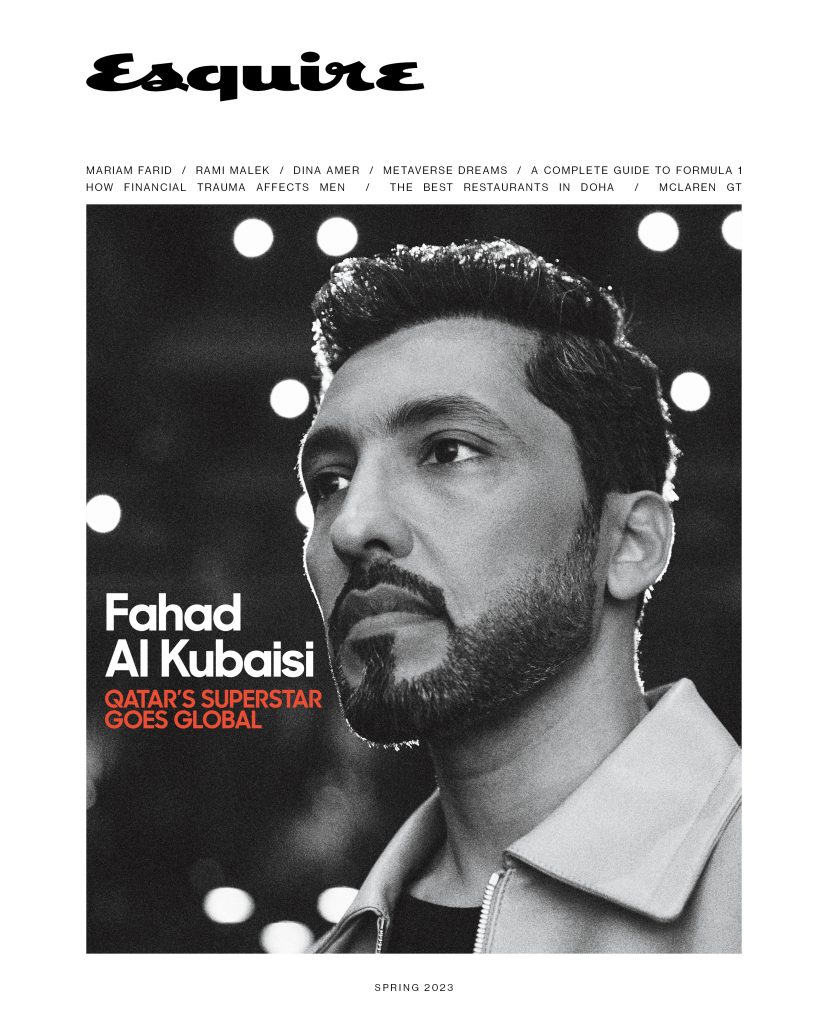
Looking back on it a few months later, as he sits with Esquire in the stunning new Raffles Doha in the city’s instantly iconic Katara Towers, Al Kubaisi is in some ways still living in that moment.
“I’d always dreamed about singing a song as all the world watched on. Making it come true was, honestly, the best moment of my life. Even now, I’m still living in that dream. I’m not waking up,” Al Kubaisi tells Esquire.
It’s hard to believe anyone could have dreamed this big. After all, when he first started singing, Al Kubaisi was just a teenager, born in a country in which no one before him had achieved that level of success.
“I just knew I had something to say. I had something in my soul that told me I had to let people listen to my voice,” says Al Kubaisi.
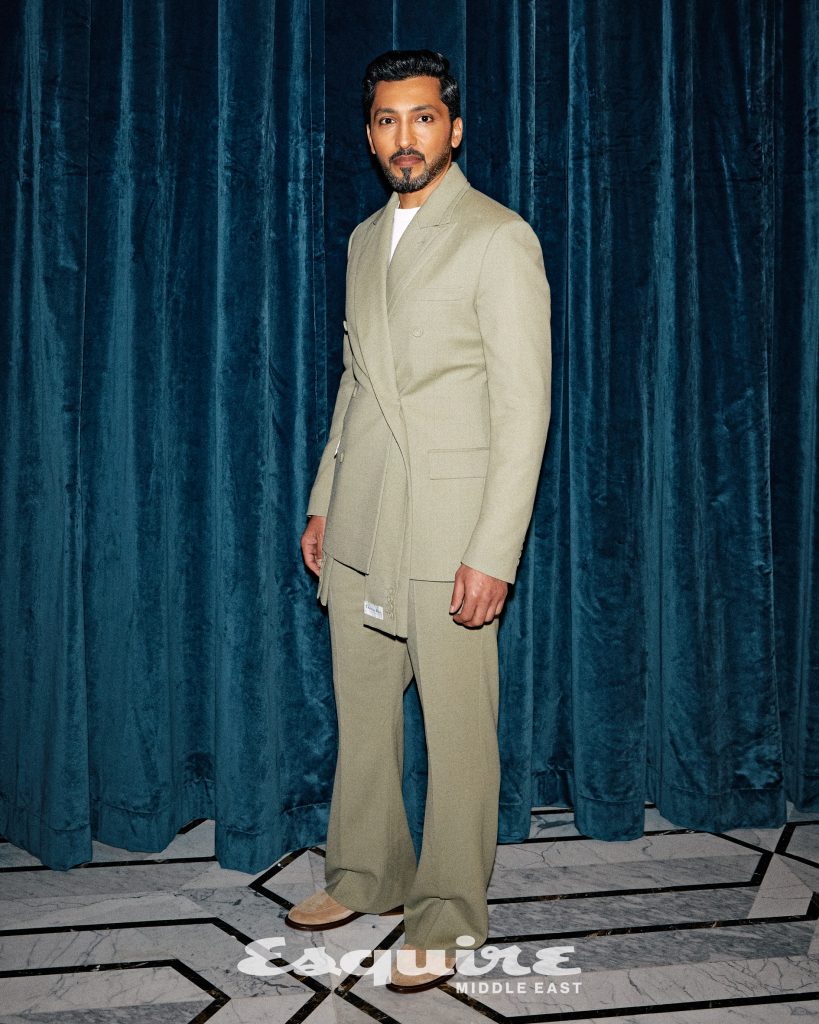
both by Dior. White cashmere crewneck sweater,
by Zegna. Suede loafers, by Brunello Cucinelli,
Location: Blue Cigar Lounge, Raffles Hotel, Katara Towers, Doha, Qatar
That was easier said than done. After all, at that period in the mid 90s, there were few places a young singer could go to develop his talent.
“There was no grand music academy training many singers, there were just small places. We call them summer centers, where students can go to try out different things. I knew I had talent, and I told them I want to sing, but I didn’t know where to do it,” says Al Kubaisi.
The instructors encouraged him towards Islamic songs, giving him a bit of help in short courses alongside others far less ambitious than he.
“This is what’s approved by families in Qatar, that’s the safe way to pursue singing here. So that’s where I began,” says Al Kubaisi.
As he returned to school, he sang wherever he could publicly, while privately pushing himself into new territory in every spare moment.
“My teachers all knew I had a good voice, so they always let me sing the solos at each school recital. At home, I tried to compose some small songs, even though it wasn’t professional.”
While he was not yet singing his own work publicly, his standout presence in high school got the attention of music figures across the country.
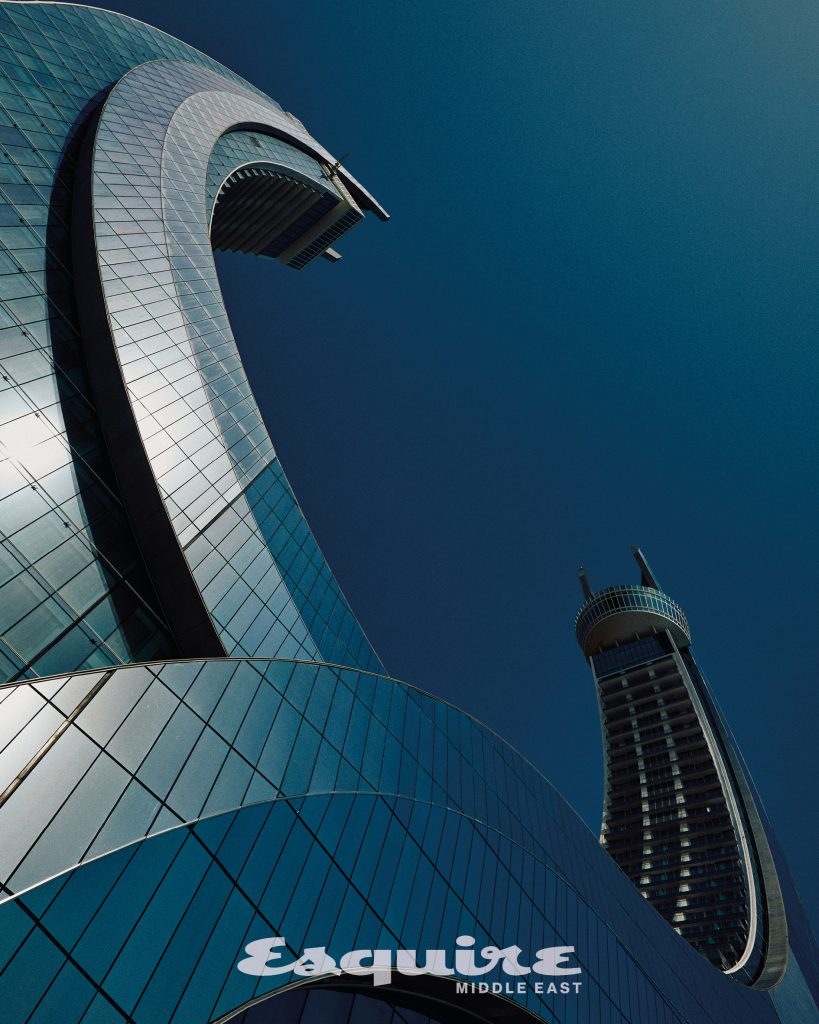
“I was very young, around 17 years old, when all of these musicians heard about me, heard my voice, and called me. They were so supportive right away. We sat together and they pushed me further, supporting me in my career of becoming a singer,” says Al Kubaisi.
“I started with a chorus here in Qatar, singing national songs, and it became bigger and bigger.”
Still, that didn’t mean that Al Kubaisi was to become an overnight star. While he kept singing for years, winning over each audience he performed in front of, it wasn’t until 2003 that he finally decided to dedicate himself to his dream and leave all other pursuits behind.
“I graduated with a degree in Physical Education, and I was the top student in all of Qatar in that field, and even a successful handball player. When I finished, I pursued that full time, but after a year in the sport industry, I realized it wasn’t my place. I had to change, I had to go into music,” says Al Kubaisi.
Within seconds of that epiphany, Al Kubaisi acted without hesitation.
“I cannot forget this moment. I was sitting behind my computer at the office, and I stood up, and never came back. I just knew that my career, my life, shouldn’t be this.”
At home, his parents simply didn’t believe what they were hearing.
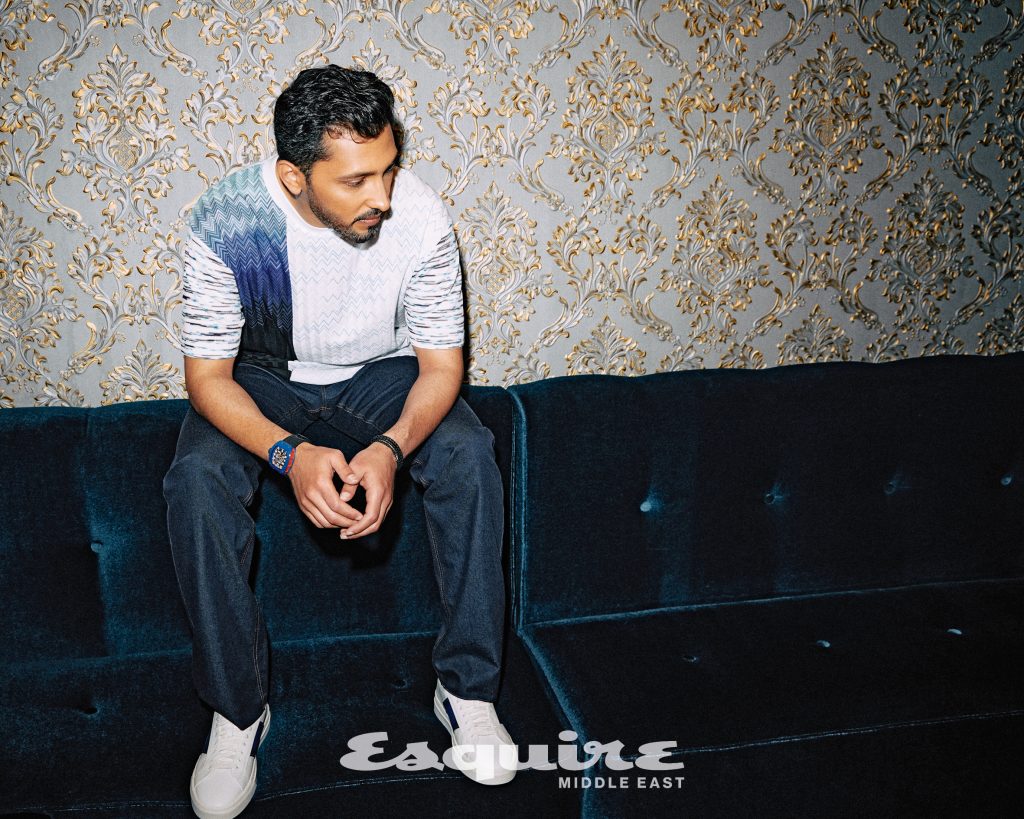
Richard Mille Watch, Bracelet, both Fahad’s own
“They didn’t think I was so serious about it. They thought it was just a hobby, saying I could always make time to sing and do music. When I had made my decision and I told my father and my mother, they said, ‘This is your life, but we don’t think you have to do this’,” says Al Kubaisi.
Al Kubaisi couldn’t blame them. After all, a successful career in the sports industry was a virtual certainty. Success in music was something very few, even the most talented, ever find. But deep in his bones, the singer could hear the calls of fate that his parents could not.
“I trusted my talent,” he adds succinctly.
Confidently, Al Kubaisi went out into the world of music, looking for people who would see in him what he saw in himself. To his disappointment, they just weren’t there yet.
“There are just one or two big production companies in the whole region, and there’s no one there that wants to listen to you if you’re unproven. I was just starting out, no one knew me. So I went to them, and they either rejected me directly, or they said they’d do something once without any real commitment.”
Undeterred, Al Kubaisi decided to go it alone. If the best producers in the region wouldn’t answer his calls, he would have to start producing himself.
“I started collecting money from my father, even from my friends, just to record something simple, just to let somebody listen to my voice. In 2005, I released a song called “Aljeru7 [Wounds]”—a very simple one. When people heard it, they loved it. That became my key through the door,” says Al Kubaisi.
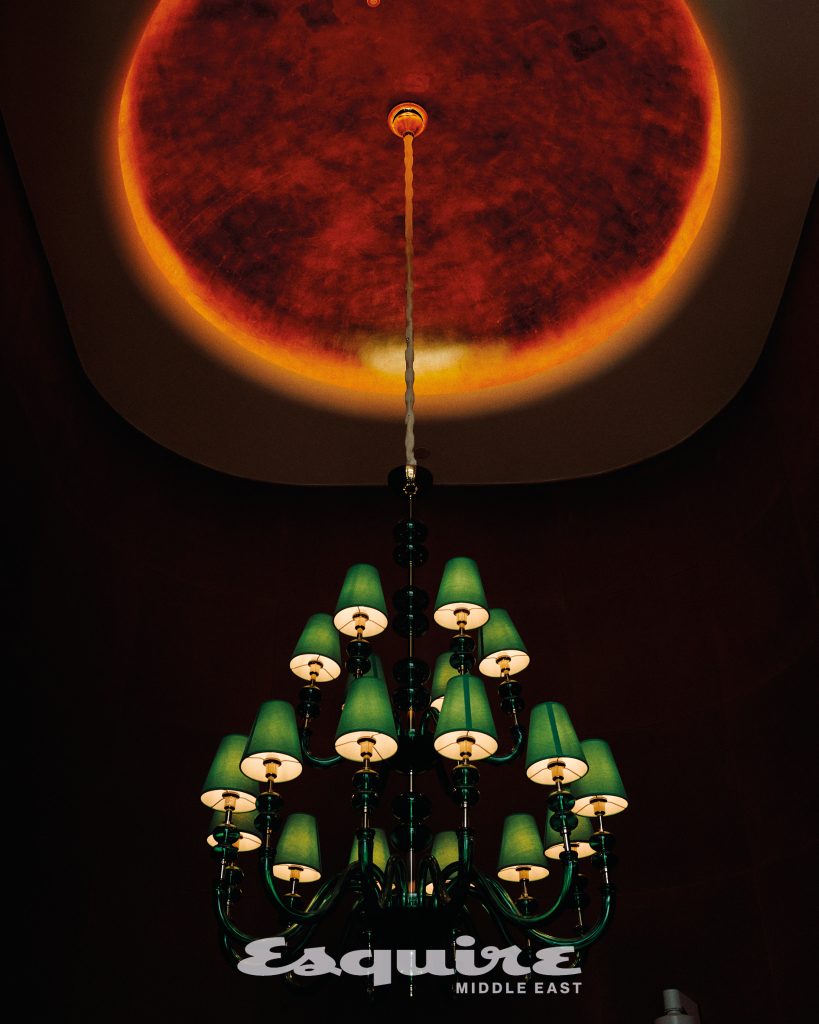
Al Kubaisi finally got the companies to say yes to him, accepting he was good enough to invest in. He released his first full-length soon after, but the reaction wasn’t what he hoped.
“My first album wasn’t that successful. Then the second one was the same thing. Then finally, with my eight-song third in 2010, things started booming for me. That’s when everything really started to get going.”
What changed? In Al Kubaisi’s eyes, two things: maturity and trust.
“It’s not easy to find a hit. By that point, I had grown as a person, learned a lot about music, and the best songwriters in the region had heard the first two albums and said, ‘ok, we can do something for you.’”
The following decade saw Al Kubaisi’s star rise higher and higher, not only in his native Qatar, but across the region, where he developed a dedicated following. The accolades kept coming, as he became the first artist from the region to be nominated for a Grammy Award in 2017, the first Arabic-language artist to attend the Grammy ceremony, the first Arab Grammy member in the history of the Recording Academy, as well as the the first Arabic-language artist to win a Hollywood Music and Media Award in 2018. By the time the World Cup approached, he was the clear choice to represent his nation. What shocked him, however, was who he was set to be working with.
“As soon as they informed me about the opening of the World Cup, my immediate question that followed was: ‘Who is the artist who will be performing with me?’ When they told me Jung Kook of BTS, it was a big surprise for me, as I was expecting, frankly, an artist from Europe or America. I wasn’t expecting an artist from a different side of the world, with a different audience, a different style,” says Al Kubaisi. “But honestly, there was no better choice.”
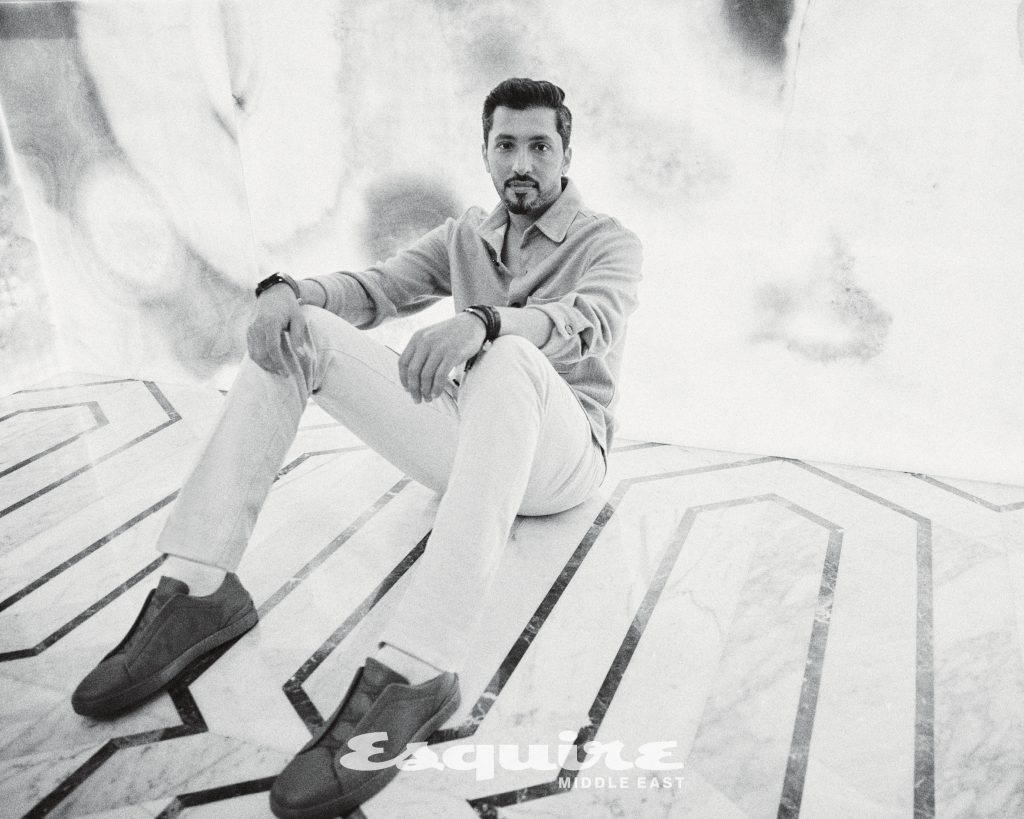
Cotton and linen trousers, all by Loro Piana. Round
toe slip-on leather sneakers, by Zegna. Richard Mille Watch,
Bracelet, both Fahad’s own
When the song was nearly complete, the composer reached out to Al Kubaisi, wanting him to craft his own contribution.
“The composer presented this wonderful melody, with beautiful words and an inspiring idea, and asked that I might write the Arabic passage with a melody that I can present to our people that would work in harmony with Jung Kook’s parts.”
The process took months, as they went back and forth, taking four or five versions until they got it right.
“The effort was worth it. It was one of the most beautiful experiences I’ve had, working with this wonderful artist with a presence, charisma and multiple talents all his own. He recorded in his country, I recorded in mine, and by the time we met to film together in Doha, we had forged an excellent relationship,” says Al Kubaisi.
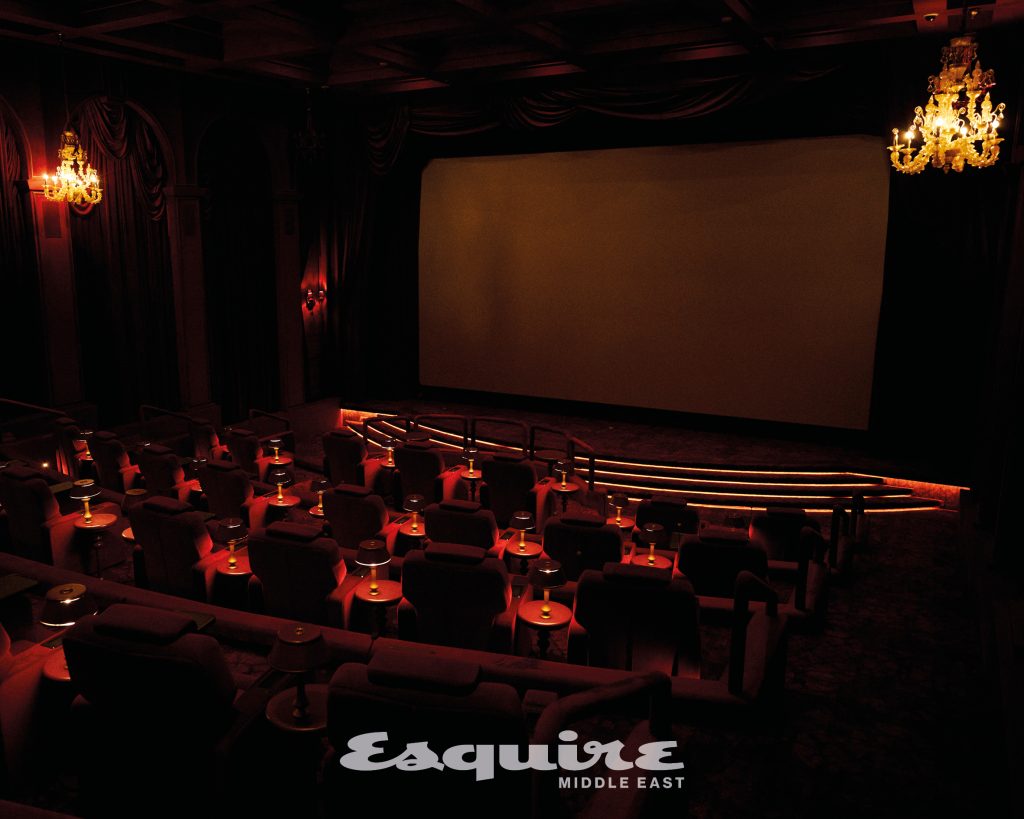
While he’s still living in that dream, the singer is also keenly aware of the expectations that his newfound success has brought him. In that moment, he finally caught the world’s gaze. The question now is, can he keep it?
“Honestly, I’ve never felt pressure like I have in this time after the World Cup. Everybody is looking at me differently than before. It’s a very big responsibility for me. Everybody is expecting even bigger things, not just here in the Gulf but across the world. I was in Morocco a month ago, and every person there knows me. Everyone was asking what I’m going to do next,” says Al Kubaisi.
“Now I have fans from Korea, from Brazil, from countries across the world, and it all feels very big. It’s difficult to navigate, because I’m not the only one feeling this pressure—everyone around me is feeling it too.”
What could Fahad Al Kubaisi do next? Looking at the face of his friend and collaborator, BTS’s Jung Kook, on stage, it was clear: Anything. After all, 10 years ago it would have been impossible for a Korean artist to be given a platform like the World Cup opening ceremony, a moment built to unite the world with a universally popular artist. In 2022, it was the obvious choice. In that span of time, Korea found a way to blend its style with Western pop in a way that people across the world found irresistible. Why couldn’t Al Kubaisi do the same thing for the music of the Gulf?


“I’m thinking now, how can I take our traditional music, and mix it with Western music, with global music? How can I keep this crossover going? This is very difficult, our traditional music has a very local sensibility. It’s difficult to get other people to feel it. So we need to do something very simple, to whittle it down to its core elements to allow the world to understand where we’re coming from,” says Al Kubaisi.
“And I can be the face of that. That puts so much pressure on me, on my image. I have to think about what to wear, how to look, how to position myself. I have to be the package that presents us to the world.”
How will Al Kubaisi present himself to the world? Look back to his biggest moment for a clue. When Jung Kook bellowed his name, Al Kubaisi did not come out in a futuristic outfit like those adorning the dancers around him. Rather, he wore a traditional thobe, and on his head a gutra in the colours of his own country’s flag. Al Kubaisi is a Qatari through and through, and whatever he does next will keep that identity front and center as he continues to act as an ambassador for his nation, introducing new fans to the many beautiful things his culture has to offer.
And how will he succeed with all of this pressure, all of this responsibility placed upon him? How will he secure the collaborations with globally popular artists needed to take his career, and all of Khaleeji music, to the next level? In the midst of another round of uncertainty, Al Kubaisi knows the answer—the same one that got him through each round before.
“In the end, I have to trust my talent once again. My talent will get me anywhere I dream of going.”
See more of Fahad Al Kubaisi in the spring issue of Esquire Qatar, on newsstands now across the country
Photography by Vladmir Marti
Fashion & styling by Laura Jane Brown
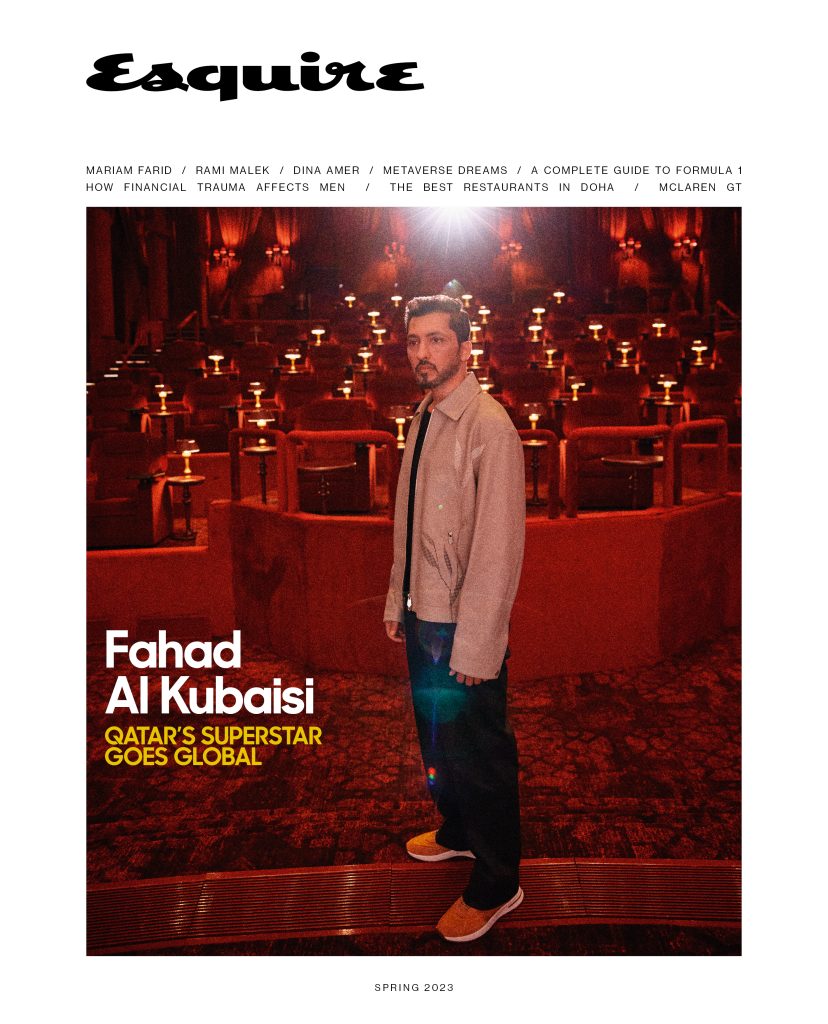
Bouguessa. Wind microfibre and suede sneakers,
by Loro Piana
Make-Up by Zeina El Naggar / Hair by Halilat Aldo Coppola / Producer Natascha Hawke
Location: Blue Cigar Lounge, Raffles Hotel, Katara Towers, Doha, Qatar
